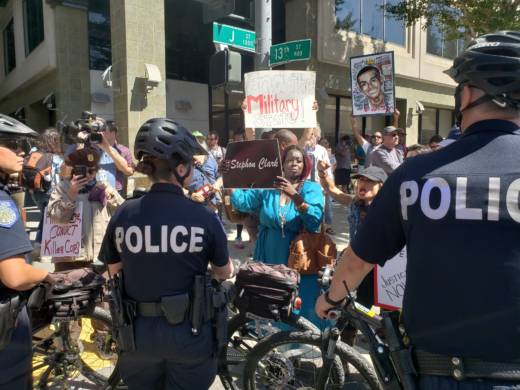A controversial measure that would prevent law enforcement officers in California from using deadly force except when absolutely necessary cleared its first legislative hurdle on Monday.
Bill to Limit Police Use of Force Advances in State Legislature

In a 5-2 vote, the Assembly Committee on Public Safety advanced AB 392, known as the California Act to Save Lives, during a hearing that drew passionate, emotional testimony from supporters and detractors of the measure, including law enforcement officers and the families of police shooting victims.
The bill would update the current “reasonable” deadly force standard to “necessary,” and make it easier to file criminal charges against officers who use lethal force when other options are potentially available.
Assemblywoman Shirley Weber, D-San Diego, who introduced the legislation, said it will prevent “unnecessary deaths” by “clarifying law enforcement’s obligations.”
“Current law results in officers killing civilians far more often than necessary, leaving many families and communities devastated and the general public less safe,” Weber said during the hearing. “These tragedies disproportionately impact communities of color.”
Weber noted that cities that have already implemented stricter use-of-force policies, including San Francisco, have experienced a decrease in officer-involved shootings with no negative impacts to the safety of officers or the public. California’s original use-of-force law, she added, dates back to 1872 and hasn’t been amended since then.
Family members of victims filled the hearing room in support of AB 392. Ciara Hamilton’s cousin, Diante Yarber, 26, was shot and killed by police in April 2018 while he drove through a Walmart parking lot in Barstow (San Bernardino County). Police said he refused to turn off his engine and show them his hands.
“He was taken from us because the police in California were and are allowed to shoot people, even when they have alternatives to deadly force,” she said. “That’s why I’m here today, to respectfully ask the committee to pass AB 392. I want to feel protected by law enforcement, not in fear of my life because they might mistake my phone for a gun or may shoot into a vehicle that I’m in because of the color of my skin.”
But law enforcement groups say Weber’s bill is misguided. They maintain that shootings often happen in a matter of seconds when officers don’t have time to think through whether deadly force is truly necessary, as opposed to simply reasonable, the current standard.
“AB 392 is an impossible standard,” said Shane LaVigne, a legislative advocate with the California Statewide Law Enforcement Association. “Officers are often forced to make split-second judgments in circumstances that are tense, uncertain and rapidly evolving. AB 392 would require superhuman decision-making that is simply not possible.”
Sacramento County Deputy Sheriff Julie Robertson also spoke passionately against the legislation, describing an incident last year when she and her partner responded to a disturbance at an auto parts store. The suspect, she said, opened fire immediately after they arrived, killing her partner and wounding her and a store employee.
“I was fighting for my life and fighting to protect complete strangers as I chose to stand between the gunman, employees and patrons,” she told the committee. “The thought of having to second-guess my actions in that moment is frightening.”
Even as the committee moved to advance the bill, several of its members expressed concern that the current language was too restrictive for law enforcement and encouraged Weber to adopt more moderate legislation.
But not all law enforcement officers stand opposed to the measure. Cheryl Dorsey, a retired Los Angeles Police Department sergeant, said too many officers are reluctant to de-escalate contentious situations and often resort to using force when it can be avoided. She cited the police shooting death of Stephon Clark, an explosive incident that provided the necessary political momentum for Weber to introduce her original use of force bill that stalled last year.
“Just because an alleged suspect attempts to evade arrest by jumping fences and hiding in a backyard, he should not be executed when cornered,” she said of the young unarmed black man shot to death by Sacramento police in March 2018. “Stephon Clark was chased into a contained area. Officers were aided by the illumination of an air unit. Rather than seek cover … and establish a perimeter, the officers fired 20 rounds at Stephon.”